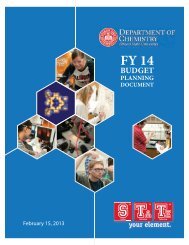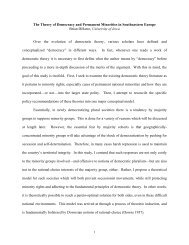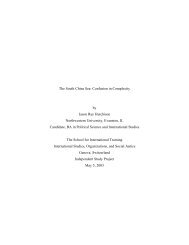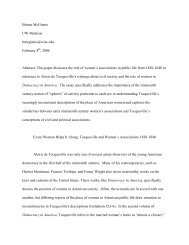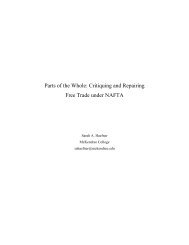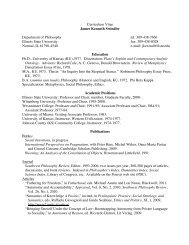1 Procedural and Substantive Conceptions of Democracy in Four ...
1 Procedural and Substantive Conceptions of Democracy in Four ...
1 Procedural and Substantive Conceptions of Democracy in Four ...
Create successful ePaper yourself
Turn your PDF publications into a flip-book with our unique Google optimized e-Paper software.
are be<strong>in</strong>g threatened, public underst<strong>and</strong><strong>in</strong>g <strong>of</strong> <strong>and</strong> pr<strong>in</strong>cipled support for structural elements <strong>of</strong> a<br />
democracy may be essential to the prospects for last<strong>in</strong>g democratic <strong>in</strong>stitutions.<br />
If support for democracy rests on expectations <strong>of</strong> substantial changes <strong>in</strong> redistributive policies or<br />
economic conditions, this support may falter if expectations are not met. Although some research f<strong>in</strong>ds<br />
evidence that democracy tends to reduce <strong>in</strong>come <strong>in</strong>equality (e.g., Reuveny <strong>and</strong> Li 2003), there is little<br />
evidence <strong>of</strong> rapid reductions <strong>in</strong> <strong>in</strong>come <strong>in</strong>equality or dramatically <strong>in</strong>creased provision <strong>of</strong> basic services <strong>in</strong><br />
new democratic regimes ( e.g. Bollen <strong>and</strong> Jackman 1985; De<strong>in</strong><strong>in</strong>ger <strong>and</strong> Squire 1996; Simpson 1990).<br />
Additionally, research f<strong>in</strong>ds that global trends <strong>in</strong> economic trade appear to be <strong>in</strong>creas<strong>in</strong>g <strong>in</strong>equality (e.g.,<br />
Dreher <strong>and</strong> Gaston 2008). Thus, to the extent that a new democracy is able to address economic problems<br />
like <strong>in</strong>come <strong>in</strong>equality <strong>and</strong> lack <strong>of</strong> access to basic resources, these effects may be dampened by factors<br />
beyond the new regimes control. Even if a new democratic regime succeeds <strong>in</strong> address<strong>in</strong>g the economic<br />
concerns <strong>of</strong> the public, democracy may prove fragile if people fail to object when leaders credited with<br />
improv<strong>in</strong>g conditions backslide on democratic procedures.<br />
Us<strong>in</strong>g data from a survey conducted <strong>in</strong> four Arab populations – Algeria, Jordan, Lebanon, <strong>and</strong><br />
Palest<strong>in</strong>e, we exam<strong>in</strong>e how people def<strong>in</strong>e democracy. The survey <strong>in</strong>cluded questions ask<strong>in</strong>g respondents<br />
to <strong>in</strong>dicate what they saw as the most <strong>and</strong> second most important characteristics <strong>of</strong> a democracy. They<br />
were provided with two options that focused on the procedural aspects <strong>of</strong> a democracy (the opportunity<br />
to replace leaders through a vot<strong>in</strong>g process <strong>and</strong> freedom to criticize those <strong>in</strong> power) <strong>and</strong> two items that<br />
focused on substantive outcomes (low <strong>in</strong>come <strong>in</strong>equality <strong>and</strong> provision <strong>of</strong> basic necessities). Over fifty<br />
percent <strong>of</strong> respondents <strong>in</strong> our sample <strong>in</strong>dicated that one <strong>of</strong> the substantive outcomes was the most<br />
essential characteristics <strong>of</strong> democracy, with 31 percent prioritiz<strong>in</strong>g both <strong>of</strong> the substantive outcomes over<br />
the procedural options. This suggests that for many people <strong>in</strong> this region, assessments <strong>of</strong> the quality <strong>of</strong> a<br />
new democratic regime may rest on the substantive outcomes the government produces, rather than the<br />
procedural aspects <strong>of</strong> how the government operates.<br />
We make three contributions to our underst<strong>and</strong><strong>in</strong>g <strong>of</strong> how people <strong>in</strong> the Arab world underst<strong>and</strong><br />
democracy. First, we exam<strong>in</strong>e the correlates <strong>of</strong> how <strong>in</strong>dividuals conceive <strong>of</strong> democracy. Specifically, we<br />
3



